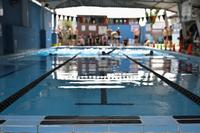If timing and preparation work in your favor, you may not have to wait long to make the transition from civilian life to your military career. Many Americans make an incorrect assumption that the time to join is immediately after high school or college.
In reality, the proper time to join is when you are physically and mentally ready, and that may not line up perfectly with your "schedule." In fact, I often tell people who are preparing to serve not to set a timeline but instead set a performance starting line.
You need many pieces to ensure you are properly prepared to enter the military and do the job you select. Before you even swear in, you will be required to get through a military medical review at a Military Entrance Processing Station (MEPS). If you are eligible, you will continue the pre-selection process and take a variety of tests related to the role you want in the military.
Many candidates fail to meet the standards on the following tests, either to enter the military in general or for the specific standards required to enter demanding and competitive programs like pilot, nuclear power, special warfare, etc.
ASVAB -- The Armed Services Vocational Aptitude Battery
You will need to have some understanding of how the ASVAB works if you want to perform well. If you are not good at standardized tests, it is important to take a few practice tests and purchase an ASVAB study guide. At first, you may find it more difficult to score well enough to qualify for the job you seek in the military.
Even if you pass the test to serve, you may not qualify for your first job choice. However, with just a little more patience, practice and study of the ASVAB guide, your military career could be entirely different and more like the one you planned.
Take the time to understand what score you will need to qualify for your career option, then take a practice test and honestly assess your abilities. You may need to spend more time preparing to improve instead of potentially making a big mistake.
Officer Academic Tests
The Army, Marine Corps, and the U.S. Coast Guard use the ASVAB for officer applicants. However, the officer candidates preparing for the Air Force and the Navy must perform well on the Air Force Officer Qualifying Test (AFOQT) or the Navy (Aviation Selection Test Battery -- E series (ASTB-E) is used for Navy, U.S. Marine Corps and Coast Guard aviation candidates.
These tests are very competitive and require intense preparation if you want to be a successful officer candidate. Whether it be through Officer Candidate School (OCS), ROTC (Reserve Officers' Training Corps) or a service academy, your academic and physical preparation will be constantly tested. Prepare well.
Physical Fitness
Depending on the branch of service and the job you want within that branch of service, the physical fitness standards range from the basic physical fitness test minimum to the maximum scores required to be a competitive candidate in special operations programs. The preparation is different, but the work required to get to higher physical standards is similar, relatively speaking.
If you are a beginner to physical activity and also overweight, your preparation to serve in the military may take from six months up to a year. The same holds true for the special operations candidate. Though you may be in decent shape at first, becoming a competitive special operations candidate may also take six months to a year or more. Regardless, patience in your training program will be the determining factor to success in getting accepted into the military or a spec ops training and eventually graduating.
Height and Weight Standards
One of the toughest hurdles for recruits today is meeting the military's height and weight standards. Some branches of service are finding ways to allow overweight recruits into the military if they qualify in all other areas in order not to miss out on needed talent. Losing weight is not easy and requires patience and consistency for the type of long-term success you need within the military.
Today, I witnessed two stories that demonstrate how someone can make the timeline to join and the performance starting line meet at the same point.
1. College Student to SEAL Training
This student has been a competitive swimmer for three years and preparing for Navy SEAL training, after he graduates nine months from now. He is ready to go now, in my opinion, but must finish school before he enlists. His plan is to finish in May and go to boot camp in June of next year.
He has done the hard work already, can crush the entry physical fitness test, and is now just maintaining and fine-tuning his abilities before he joins in a few months. This is an example of using his time wisely in one phase of his life to prepare for the next chapter of his life. His performance starting line and timeline to join will meet perfectly as he closes the book on his academic life and transitions into the military.
2. Marine Officer Candidate
This candidate has also been training for three years, but his journey did not start until after college. Now three years post-college, he is finally ready to ship to OCS in the Marines this month. He recognized he was not prepared to join right after college, so he first got some work experience, grew, matured and made sure he was able to perform at the standards expected of a Marine officer candidate.
This candidate was wise not to start a timeline that was going to prepare him inadequately. Instead, he set some physical standards for himself and took time and effort to reach them. Now, he is ready.
People who give themselves more time to prepare for their projected transition date are usually more successful and enjoy serving with their first-choice military specialty. Take the transition from civilian life to the military seriously and make sure you are ready by actually testing yourself to make sure you do not fail the first test you ever take in the military.
Stew Smith is a former Navy SEAL and fitness author certified as a Strength and Conditioning Specialist (CSCS) with the National Strength and Conditioning Association. Visit his Fitness eBook store if you're looking to start a workout program to create a healthy lifestyle. Send your fitness questions to stew@stewsmith.com.
Want to Learn More About Military Life?
Whether you're thinking of joining the military, looking for fitness and basic training tips, or keeping up with military life and benefits, Military.com has you covered. Subscribe to Military.com to have military news, updates and resources delivered directly to your inbox.


















